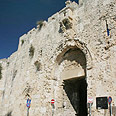
'Hundreds of Israelis tramped their way up the steep hill outside Zion Gate'
Photo: Ron Peled
The thumping music penetrated our apartment even though we were locked down against the heat of an early-season heat wave. My kids ran to the window, and began pointing wildly at the gaudy truck from which the music was throbbing as it made its way up our street.
The truck was covered with an exoskeleton of pipes, tubes, wires, fiber optics, Sephardic Torah cases, and other unidentifiable objects. It stopped just down from our window, and a crowd began to gather around. What was going on?
One floor below us in our apartment building the finishing touches were being put on a Torah scroll destined for a neighborhood synagogue. As is the custom, a celebration (hence the truck) was in order. Dozens of people, young women in tight jeans and older women with covered heads, young men in tight jeans with kippot balanced precariously on their gelled heads, older men more comfortable with the traditional headgear, and children – lots of children – walked in and out of our building and milled on the pedestrian promenade at our front door.
At long last
Finally – two hours after it was supposed to come out – the heavy wooden "tik" (Sephardic Torah case) made its way out of the building toward its new home two blocks away. Four men carrying a dark blue velvet chuppah (canopy) on wood poles surrounded the tik's honorable carriers. Chanting, singing, and clapping people preceded it down the street.
By then it was dark, and the sound truck had sprouted not only additional fiber optic antenna, but swirling lights, flashing neon tubes, and dry ice smoke that wreathed it in even more tacky splendor.
Kids scrambled for sweet toffee candies as they fell to the ground after being tossed by celebrants. A rabbi with a microphone exhorted the crowd to dance and sing and auctioned off the right to carry the Torah a few meters down the street. By my count, they raised nearly 2,000 shekels (USD 450) in the first hundred meters.
We saw a somewhat less smoke- and music-wreathed Torah parade a few days before. The teeball team I coach had just finished its first game (We won, I'm happy to say.), and we were resting with Cokes and popsicles when a throng of people came dancing down the street – once again accompanied by blaring Mizrahi (Eastern, "Oriental") music. It was a Sephardic Torah scroll bound for its new home at a synagogue in the north end of Jerusalem.
Shavuot in Israel
What's with all this Torah writing? Shavuot, of course. The holiday that celebrates God handing the Ten Commandments (and by extension, the entire Torah) to Moses and the Israelites in the desert was celebrated last weekend. I spent Shavuot morning (and I mean early morning) on my way to the Old City of Jerusalem for holiday prayer services sponsored by the Masorti (Conservative) movement at Robinson's Arch, an isolated section of the Western Wall exposure reserved for mixed (that is, men and women together) prayers.
Before I even reached the Old City, I was joined by hundreds of Israelis as they tramped their way up the steep hill outside Zion Gate. The narrow stone path has been worn smooth by the thousands who use it annually, and the dirt shortcuts are even more tamped down.
The morning prayers at Robinson's Arch (known as the "Masorti Kotel") were themselves a pleasure. Isolated from the sea of black-clad haredim that engulfs the main Kotel Plaza on Shavuot, the mixed prayer service is a colorful swarm of young and old, Israeli and American.
Blessed normalcy
What's the central theme here? The underlying principle that makes all this narration worth reading? I'll spell it out for you: In Israel, Jews unabashedly, unashamedly, and openly celebrate their Jewishness, their connection to tradition, and their joint Israeli and Jewish identities.
The fact that such scenes are unremarkable – and, really, they are – a lot of people walked or drove past yesterday's Torah parade on a main street of town without blinking or even turning their heads – is what is remarkable.
With the exception of a few ultra-Orthodox enclaves outside the Holy Land this kind of normal, everyday Jewishness is rare. I guess that's the reason for Israel in the first place – not so we can be a remarkable people, but that we can live our own lives under our own political sovereignty without having to seek the protection of outside authority. It's worth a lot.
Alan D. Abbey is Founding Editor of Ynetnews. His website is www.abbeycontent.com















